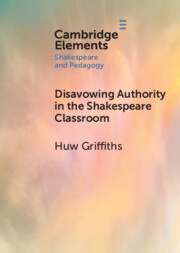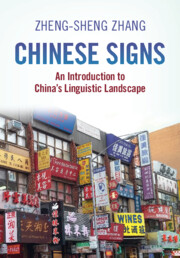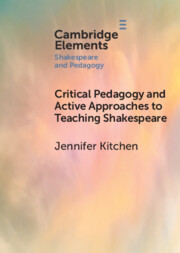285 results
2 - Emoji Literacy as a Teaching Tool
-
- Book:
- Emoji in Higher Education
- Published online:
- 30 May 2024
- Print publication:
- 06 June 2024, pp 29-55
-
- Chapter
- Export citation
Chapter 1 - The Self-Knowledge Necessity
-
- Book:
- Neoplatonic Pedagogy and the Alcibiades I
- Published online:
- 16 May 2024
- Print publication:
- 23 May 2024, pp 12-27
-
- Chapter
- Export citation
Introduction
-
- Book:
- Neoplatonic Pedagogy and the Alcibiades I
- Published online:
- 16 May 2024
- Print publication:
- 23 May 2024, pp 1-11
-
- Chapter
- Export citation
10 - Liberty, Violence and Practical Reason:
- from Part III - The Religious Epistemology of the Cambridge Platonists
-
- Book:
- The Cambridge Platonists and Early Modern Philosophy
- Published online:
- 09 May 2024
- Print publication:
- 16 May 2024, pp 269-285
-
- Chapter
- Export citation
Opening a conversation on responsible environmental data science in the age of large language models
-
- Journal:
- Environmental Data Science / Volume 3 / 2024
- Published online by Cambridge University Press:
- 09 May 2024, e14
-
- Article
-
- You have access
- Open access
- HTML
- Export citation
Using Assassin's Creed: Odyssey to teach Olympia as part of the Classical Civilisation A Level
-
- Journal:
- Journal of Classics Teaching , First View
- Published online by Cambridge University Press:
- 02 May 2024, pp. 1-7
-
- Article
-
- You have access
- Open access
- HTML
- Export citation
Coming of age within ‘implosion’
-
- Journal:
- Review of International Studies / Volume 50 / Issue 3 / May 2024
- Published online by Cambridge University Press:
- 06 May 2024, pp. 441-456
- Print publication:
- May 2024
-
- Article
-
- You have access
- Open access
- HTML
- Export citation

Disavowing Authority in the Shakespeare Classroom
-
- Published online:
- 02 April 2024
- Print publication:
- 25 April 2024
-
- Element
- Export citation

Chinese Signs
- An Introduction to China's Linguistic Landscape
-
- Published online:
- 29 February 2024
- Print publication:
- 07 March 2024
Translating survivor-centredness into pedagogical approaches to training on sexual violence in conflict and emergency settings: A case study
-
- Journal:
- International Review of the Red Cross , First View
- Published online by Cambridge University Press:
- 22 January 2024, pp. 1-24
-
- Article
-
- You have access
- Open access
- HTML
- Export citation
Chapter 10 - Enhancing young children’s science identity through pedagogical practices
- from Part 2 - How can I enhance children’s learning of science?
-
-
- Book:
- Science in Early Childhood
- Published online:
- 13 December 2023
- Print publication:
- 10 January 2024, pp 151-162
-
- Chapter
- Export citation
Teaching Charles Alexander Eastman’s “The North American Indian” in Dialogue with Elaine Goodale Eastman’s Yellow Star
-
- Journal:
- The Journal of the Gilded Age and Progressive Era / Volume 23 / Issue 1 / January 2024
- Published online by Cambridge University Press:
- 16 April 2024, pp. 107-114
- Print publication:
- January 2024
-
- Article
- Export citation
16 - What are some of the most popular language teaching methods?
- from Part IV - Lesson and Unit Planning
-
- Book:
- The Art and Science of Language Teaching
- Published online:
- 21 December 2023
- Print publication:
- 21 December 2023, pp 233-248
-
- Chapter
- Export citation
Rethinking pedagogic identities for Key Stage 3 general classroom music teacher education: an autoethnographic study
-
- Journal:
- British Journal of Music Education , First View
- Published online by Cambridge University Press:
- 18 December 2023, pp. 1-12
-
- Article
-
- You have access
- Open access
- HTML
- Export citation
Chapter 6 - Excluded Lives
-
-
- Book:
- Agency and Transformation
- Published online:
- 23 November 2023
- Print publication:
- 30 November 2023, pp 139-161
-
- Chapter
- Export citation
Teaching the difficult heritage of Italian Fascism
-
- Journal:
- Modern Italy / Volume 29 / Issue 1 / February 2024
- Published online by Cambridge University Press:
- 29 November 2023, pp. 97-107
- Print publication:
- February 2024
-
- Article
-
- You have access
- Open access
- HTML
- Export citation
Steps towards inclusivity: modifying challenging content, navigating pedagogical materials and initiating student reflection within the Classics classroom
-
- Journal:
- Journal of Classics Teaching / Volume 25 / Issue 49 / Spring 2024
- Published online by Cambridge University Press:
- 29 November 2023, pp. 4-7
-
- Article
-
- You have access
- Open access
- HTML
- Export citation

Critical Pedagogy and Active Approaches to Teaching Shakespeare
-
- Published online:
- 14 November 2023
- Print publication:
- 07 December 2023
-
- Element
- Export citation
Chapter 11 - Orality, Experiential Learning, and Decolonizing African Literature
- from Part II - Methodologies
-
-
- Book:
- Decolonizing the English Literary Curriculum
- Published online:
- 02 November 2023
- Print publication:
- 09 November 2023, pp 214-235
-
- Chapter
-
- You have access
- Open access
- HTML
- Export citation
16 - Popular Sovereignty in the Trump Era
- from Part III
-
-
- Book:
- When the People Rule
- Published online:
- 23 November 2023
- Print publication:
- 09 November 2023, pp 292-303
-
- Chapter
-
- You have access
- Open access
- HTML
- Export citation



